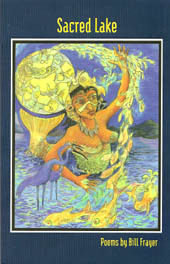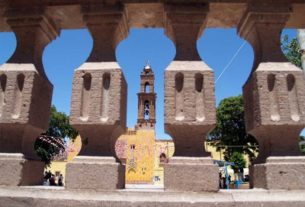Good Reading
Available from the author
 Life in Mexico observed by someone who is bursting with affection for his new country.
Life in Mexico observed by someone who is bursting with affection for his new country.
I have reviewed a lot of fiction and non-fiction books for Mexico Connect, but I have been hoping to eventually discover a collection of poems written in English by an expatriate living in Mexico.
Now I have in hand Bill Frayer’s book, Sacred Lake, and it is a lovely book, nicely produced, with lots of fine poetry. All of the poems were written since Bill arrived in Mexico last year. Bill, who lives in Chapala, Jalisco, has fallen in love with Lake Chapala, and with Mexico. In the opening poem, “Sacred Like,” the author announces that:
Yes, as I came upon this lake
So resplendent with spirits
Of many lives lived, I found my muse
And it quenched a thirst
I never felt till I fell at its bank
And drank deeply of its richness.
These poems are filled with charming details of life in Mexico observed by someone who is bursting with affection for his new country. I have often thought that a country, and land itself, really belongs to those who love it most. Bill, although he feels himself a stranger, a “Foreigner,” finds himself more and more being hugged by the big brown arms of Mother Mexico. In the second poem, “Foreigner, Walking,” Bill steps out into the heat and passes a boy “Drinking Coke and mixing sand/Into cement.” Later on that same walk he sees:
A man with a leather-lined face
Pushes an incongruously white
Straw hat up his forehead
As he leans intently, under
The open hood of a twenty-year-old
Plymouth, proud but helpless.
This is part of life in Mexico. Only today while I was walking along with Bill’s book in hand, I saw a man working on his ancient truck in Calle Zaragosa here in Chapala – the white decals on the dusty back window read “¡Jesús vive!” (Jesus lives!).
Other poems celebrate the Mexican palate, and the unfamiliar juices “Dripping on the bright tile/Of our simple, intentional life.” (“Squeezing Lime on Jicama”). In “Opening My Fruit,” the poet has awakened at dawn, and alone in the cool air he can “Work on my fruit.” As he exposes the sweet inner flesh of mangoes and papayas and melons and bananas, he becomes eager for more, and even squeezing “prickly fruit/Over-ripe” releases, unexpectedly, “Thick, white globs of life/Over my hands.”
Likewise, Bill learns to bow before the Mexican attitude toward death, so different from that of his own culture, or perhaps better to say the culture he lived in before he moved to Mexico and began to discover his “own culture.” He decides he wants to be remembered the way Mexican people remember their deceased loved ones. In “Remember Me with Good Dark Beer,” Bill has discovered that…
In Mexico, when people die
Their stay on earth does not expire,
Extending on in memory
As concrete offerings require.
Flowers, photos, food, tequila
All that they loved their families share
And gather o’er their loved ones’ bones
To eat, to weep, to laugh, to bear.
But a few short stanzas later the author steps back to take a look at the attitudes of his own (and we need to begin to say former) country, and compares Mexican practices with those we had been more familiar with before his move south.
And as I watch this ritual
With skulls and food and special bread
I think of mother’s bare, cold grave
Unvisited, of course, she’s dead;
She couldn’t know, nor could she care
If we brought her garlic bread,
Or beer, or shrimp, or needlepoint
Or tell her, “Mom, we’re all well fed!”
But, that is his “former culture,” and Bill now is begins to hope that when he dies his friends will, in good Mexican style, remember what he held dear: “like chips and good dark beer.”
In other poems, Bill is intent upon discovering “What Makes Them Sing” in spite of the expatriate culture that now “clogs” their streets, “arrogantly,” forcing them to be “accommodating.” Still, though, the Mexicans are both laughing and singing as they carry “heavy white buckets of cement/Up old and splattered ladders/Again and again in the heat.” Bill longs to (and rather obviously is learning) “to live/Among their songs.” As others, I suspect, are learning to live “among Bill’s songs.”
For many of us, once we have been in Mexico for awhile, and particularly for those of us who have made a permanent move to Mexico, something “shifts” inside and we can begin to more easily revisit and rethink and reflect upon past relationships, including those difficult relationships that can only be healed by love; indeed, most of the closing poems in Sacred Lake are about love. “How Profound is my Love?” begins this way:
How profound is my love
For the father, who,
By his gentle example,
Taught me how to live
And to think,
So that I could live,
As he,
In a world
Where character matters?
In “My Mother Dying,” Frayer is “waved… away one last time” but he is able to acknowledge to himself that she had been a difficult mother.
She had not been an easy mother
And now… alone – she needed my help
To shop, to manage.
I couldn’t sense much warmth
Or gratitude. With guilt, I knew
Her death would bring relief.
In contrast to that mother who simply “endured” him, Bill and his wife have left the “stale debris/Of yesterday behind them.” Bill and his wife have made a long journey together, ultimately to Mexico. Here the poet is rediscovering not only his own life, but his beloved wife as well.
And now we awake together to breathe the same air
And brew our tea from the same pot
Somehow having arrived in paradise
At the same time.
Earlier in the book, Bill wrote about “As I Carry the First Box into the New House,” and in that poem he and his wife are “full of hope/For years left unlived.” Reading the poems several times, I begin to feel that for Bill that “New House” is really all of Mexico, and most particularly the Mexican people. That poem ends this way:
I am content to be here
In this moment
With our future, unrevealed.

